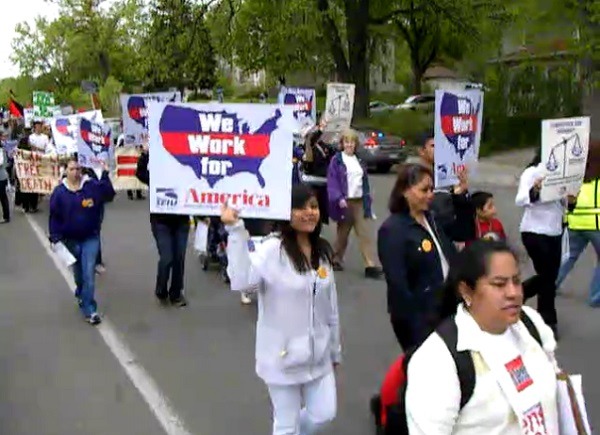
Editor’s note: This coming year promises to be one where labor questions will be front and center in national and local politics, and nonprofits of all types should consider taking strong, principled positions on such questions as the right to collective bargaining, workplace benefits and conditions, and minimum wages. (While these questions do not in any way limit the range of labor questions that face us, they do appear to be among the most active.) Connected to them, of course, are other concerns, like the growing number of “freelance” workers, out-of-control CEO salaries, widening wealth gaps and pay ratios, and much, much more.
Although nonprofits have not necessarily been particularly friendly to union organizing in nonprofit workplaces, the nonprofit sector is taking a larger role in labor issues this year. Katia Hetter’s review of the changing labor movement, published by CNN, takes note of several dynamics that have been covered extensively in Nonprofit Quarterly:
- The organizing around a $15 minimum wage, originally a campaign of the Service Employees International Union (SEIU), has expanded from unionized shops to a broader social movement, with nonprofit organizing groups taking on significant roles in organizing and mounting demonstrations across the country.
- Hetter notes that the co-founder of #BlackLivesMatter is Alicia Garza, the special projects director of the National Domestic Workers Alliance. The emerging connections between Black Lives Matter and labor organizing are increasingly evident as unions increasingly recognize the importance of racial inequities in all parts of society, including the workplace.
- Over the past decade in particular, organizing among domestic workers has taken off. The national visibility of domestic worker organizer Ai-Jen Poo and several states enacting domestic workers’ bills of rights has moved the nation’s home care workers and others out of the shadows into getting some necessary protections regarding pay, overtime, workmen’s comp, and other concerns.
- Organizing among adjunct university lecturers and other part-time university personnel by entities such as the New Faculty Majority and the Coalition of Contingent Academic Labor has made inroads in a few schools, like Tufts and Boston University.
- Although overruled by the National Labor Relations Board, the Northwestern University football players, led by former quarterback Kain Colter, have made a point about the employment conditions of so-called “student-athletes.” This issue isn’t dead, despite the NLRB ruling and the NCAA’s strident attacks.
That short list is hardly all, but the agenda for nonprofits supporting the rights of people in the labor force is still formidable. Among the priorities might be these:
- Within nonprofits, it may be important to fight against the efforts of charter schools and nonprofit private schools to bust the teachers’ unions and replace decently paid unionized teachers with lower wage, non-union, often-inadequately-trained teacher substitutes or volunteers (such as Teach for America types). If the teachers’ unions need to be shaken out of their torpor, then turn to organizing efforts such as the Badass Teachers Association, which supports unionism but hardly kowtows to the union bureaucracies.
- Within the nonprofit sector itself, there is a debate, sometimes conducted sotto voce, to exempt nonprofits from higher minimum wage or living wage requirements. While there is a need to recognize the impact of paying higher wages and the corresponding public policy obligation of government funders to increase their grant support of human service and other government-funded nonprofits to help nonprofits absorb higher wage costs, nonprofits cannot hold themselves out to be advocates of social change while asking to be protected from the social change they purportedly support.
- In the mix of charges and countercharges of what is necessary for mitigating poverty in the U.S., regardless of a position on government funding of human services, there is no question of the need for a stronger jobs policy that lifts unemployed, underemployed, and part-time workers into better jobs. Part of that solution might be a government public-service-oriented jobs program that hasn’t been tried since the CETA during the Nixon Administration. Given the nation’s stagnant wage growth, the increasing proportion of working age people leaving the labor force, and the still-high numbers of people working part-time because they cannot find full-time work, a jobs program should be a nonprofit advocacy issue.
- In the public sector, unions play an important role, but philanthropic institutions and conservative think tanks have been gearing up to attack public sector unions, along the lines of Governor Scott Walker’s agenda in Wisconsin. For those of us who have had public sector jobs and long seen presidents, governors, and Congress willing to demonstrate their budget-cutting prowess by slashing the salaries of government workers, you know the importance of strong public sector unions. Nonprofits should be especially attentive to attacks on public sector unions this year as the nation heads into presidential and congressional elections.
The ultimate expression of a nonprofit agenda for organized labor as of Labor Day 2015 might be contained in the very thoughtful comments of James Harrington, the director of the Texas Civil Rights Project:
Sign up for our free newsletters
Subscribe to NPQ's newsletters to have our top stories delivered directly to your inbox.
By signing up, you agree to our privacy policy and terms of use, and to receive messages from NPQ and our partners.
These days, a political wind is blowing to roll back the progress workers have made. Not only are we witnessing a devaluation of workers, but a hard core cadre of pundits and politician scapegoats who are collectively bargaining rights for educators, police, firefighters and other public employees. They blame these public servants for not balancing the economy on their backs. Nor, in the private sector, do they see fit to ask companies that benefit from massive profits and tax breaks to pay their fair share.
Apart from preventing backtracking of worker rights, much remains to be done to bring about full workplace justice. […] Today, on Labor Day, we should…commit ourselves to redirect our democracy to greater justice for workers. They, after all, are the backbone of our communities.
That means raising the minimum wage to a living wage, protecting workers’ pensions, boycotting companies that pursue policies of cutting back on workers’ rights, and reining in corporate executives’ out-of-control salaries. That sounds like a critically important and practical nonprofit agenda in support of working men and women and their families.
Over the next year, NPQ will continue to explore issues of labor and economic justice, and we invite you to help us do so. Meanwhile, nonprofits of all kinds should bring up these questions in their boardrooms, preparatory to taking positions and getting involved in coalition work.













